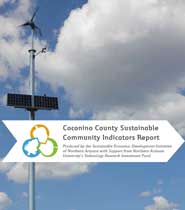
As communities contemplate how to rebuild in a wavering economy, a coalition of partners has formed in northern Arizona to chart a path for future sustainable economic development.
Supported by Northern Arizona University’s Technology and Research Initiative Fund, the Sustainable Economic Development Initiative recently completed an 18-month project that provides a baseline measure of the overall welfare of Coconino County.
The results of the Sustainable Community Indicators Project are published in a report, comprised of data from more than 15 public, private and non-profit agencies. The report is available here.
Rich Bowen, NAU associate vice president for Economic Development and executive director of the Economic Collaborative of Northern Arizona, said the report is a result of a broad coalition of more than 15 organizations and “demonstrates that all of the partners involved recognize the symbiotic relationship between community and economic development.”
“Northern Arizona University takes pride in being an active partner in its community and region as we plan for a healthy and prosperous future,” Bowen said. “This report evaluates the health of community development from a holistic approach and gives us a benchmark to evaluate the overall well-being of the community.”
The report uses 45 indicators to measure social data including household income, level of education and social services provided. The economic section of the report measures 31 indicators such as employment, small business startup activities and housing expenses and availability. The environmental indicators section uses 26 indicators including air and water quality, solid waste landfill and recycling activities and land use.
The report will enhance decision-making and policies that support overall sustainable growth in the community, said Ron Hubert, president of the Sustainable Economic Development Initiative.
“This is an important contribution to the economic development in our region, integrating the vital aspects of social equity and environmental health,” Hubert said. “We will have good feedback in the future on the effectiveness of policy decisions regarding economic, social and environmental issues.”



